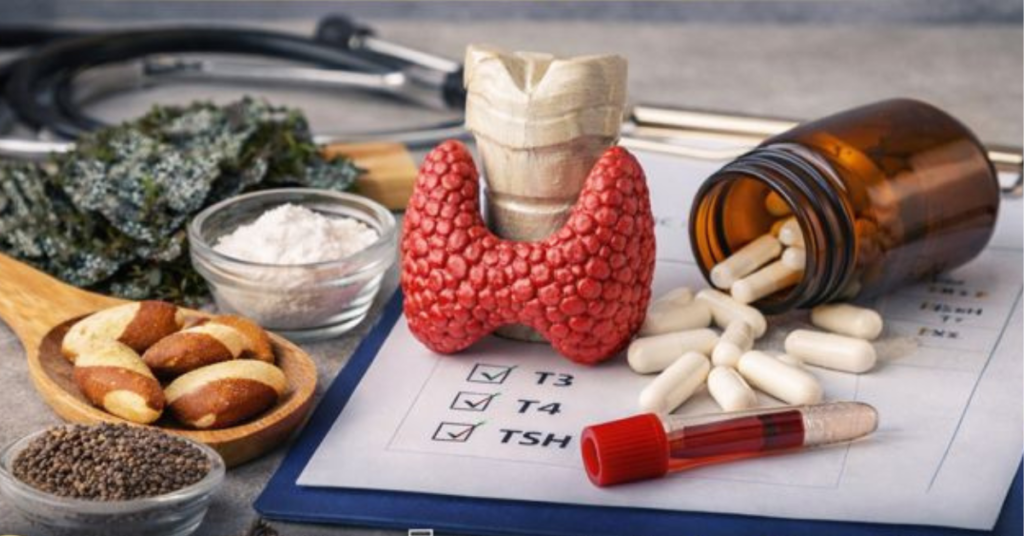
Understanding Low Thyroid Hormones
Low thyroid hormones, also known as hypothyroidism, occur when your thyroid gland does not produce enough hormones to support your body’s metabolism. Common symptoms include fatigue, weight gain, dry skin, hair loss, and sensitivity to cold. Understanding the potential causes and supportive strategies can help you manage thyroid health effectively.
Table of Contents
Medical Disclaimer: This article is for informational purposes only. Always consult a licensed healthcare provider before starting or changing treatment for thyroid conditions.
Common Causes of Low Thyroid Hormones
Identifying the root cause of low thyroid hormones can improve management:
- Autoimmune Thyroid Disease: Conditions like Hashimoto’s thyroiditis may cause the immune system to attack the thyroid. Tests for thyroid peroxidase antibodies (TPOAb) and thyroglobulin antibodies (TgAb) can help identify autoimmune involvement.
- Iodine Deficiency: Adequate iodine is necessary for thyroid hormone production.
- Medications: Some drugs (e.g., lithium, amiodarone) can affect thyroid function.
- Radiation Exposure: Neck or head radiation may impact thyroid health.
- Stress and Adrenal Health: Chronic stress can affect hormone balance, impacting thyroid function.
- Leaky Gut Syndrome
Low thyroid hormones, or hypothyroidism, can have a significant impact on digestive health, including contributing to leaky gut syndrome.
When thyroid hormone levels are low, metabolism slows down, which can reduce gut motility and impair nutrient absorption.
This creates an environment where the intestinal lining becomes more permeable, allowing toxins, undigested food particles, and bacteria to pass into the bloodstream—a hallmark of leaky gut. Individuals with low thyroid function often experience symptoms like bloating, constipation, and inflammation, which can further compromise gut integrity.
Supporting thyroid health through proper nutrition, stress management, and medical guidance may help improve gut barrier function and reduce the risk of leaky gut.
One often overlooked factor in low thyroid hormone function is chronically elevated cortisol. When the stress hormone remains high, it can slow metabolism, impair T3 conversion, and worsen fatigue.
Supporting adrenal health is an important part of thyroid wellness. Learn how stress hormones affect thyroid balance and explore evidence-based ways to lower cortisol naturally in our in-depth cortisol support guide.
Supporting Thyroid Function Naturally
Low thyroid hormones can disrupt overall hormone balance, highlighting the importance of natural thyroid support and strategies to maintain long-term natural hormone balance.
While medication such as levothyroxine is often necessary for treating hypothyroidism, several lifestyle and nutritional strategies can support thyroid function:
1. Diet and Nutrients
- Iodine: Essential for hormone production; sources include iodized salt, seaweed, and supplements if advised by a doctor.
- Selenium: Supports thyroid hormone conversion; found in Brazil nuts, eggs, and fish.
- Zinc: Helps thyroid hormones bind to their receptors; found in meat, shellfish, legumes, and seeds.
- Vitamin D & A: Important for immune function and hormone regulation.
- Balanced Diet: Include anti-inflammatory foods and minimize processed foods and refined sugars.
2. Manage Stress
Chronic stress can affect thyroid and adrenal function. Techniques such as meditation, yoga, deep breathing, and regular physical activity may help support hormone balance.
3. Reduce Exposure to Toxins
- Limit environmental toxins, heavy metals, and endocrine disruptors in household products and water.
- Consider organic, whole-food-based detox strategies under the guidance of a healthcare provider.
4. Exercise and Saunas
Regular exercise can stimulate thyroid hormone activity. Some people also use at-home saunas as part of a wellness routine, as saunas may support detoxification, improve circulation, and help reduce stored toxins in body fat. View our recommended health essentials.
5. Monitor Thyroid Antibodies
Regular monitoring of TPOAb and TgAb levels with an endocrinologist can help guide treatment and identify whether lifestyle interventions are having a supportive effect.
Can Low Thyroid Hormones Be Cured?
Hypothyroidism is typically managed rather than cured. For most individuals, lifelong hormone replacement therapy is necessary. Some exceptions exist:
- Subclinical hypothyroidism: Mild cases may sometimes be managed with lifestyle and nutritional support under medical supervision.
- Temporary hypothyroidism: Certain thyroiditis cases may resolve over time.
Discontinuing thyroid medication should always be done under a physician’s guidance.
Want more natural wellness solutions? Browse our Natural Remedy Index Tool to explore remedies for other common conditions.
Conclusion
Low thyroid hormones require a multifaceted approach. Medication, when needed, is essential, but supportive strategies—including nutrient-rich foods, stress management, lifestyle changes, and monitoring thyroid antibodies—can help optimize thyroid health.
Taking a proactive approach empowers you to manage your condition effectively, reduce inflammation, and support overall well-being. While there is no guaranteed cure, combining conventional treatment with holistic support can improve energy, metabolism, and quality of life.
Hypothyroidism FAQS: American Thyroid Association
Explore My Wellness Resources
If you’re looking for natural tools, digital wellness guides, and supportive resources mentioned throughout this article, you can find them all in one place below.
Wellness Resources